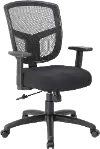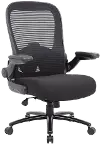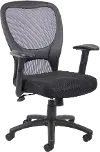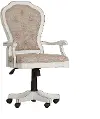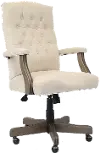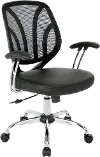RC Willey Home Office Furniture Chairs
Shop Office Chairs at RC Willey
Finding the right office chair is essential for comfort and productivity. RC Willey offers ergonomic office chairs designed to provide the support you need. Stay comfortable and focused throughout your workday with our stylish and supportive office chairs.
Shop by Type
#myrcwilleyhome
See how real customers are transforming their spaces with RC Willey. Get inspired, share your style, and create a space that's Your Home. Your Way.
Explore NowChoosing the Right Office Chair for Your Needs
When it comes to office furniture, your chair plays a pivotal role in how comfortable and productive you are throughout the day. Whether you're working from home or in a traditional office, selecting the right office chair is essential to maintaining good posture and reducing discomfort. Here’s how to choose the perfect chair that fits your needs.
What to Consider When Selecting an Office Chair
When choosing an office chair, it’s important to think about both comfort and function. First, consider how long you’ll be sitting each day. If you’ll be sitting for extended periods, look for a chair with lumbar support, a comfortable seat cushion, and adjustable features. A chair that allows you to adjust the height, armrests, and tilt will ensure that your chair is tailored to your body, keeping you comfortable and supported. The material of the chair is also a key factor—choose a breathable fabric for warmer environments or a durable leather for a professional look.
Different Types of Office Chairs
- Executive Chairs: These chairs combine style and comfort, often made from high-quality materials like leather and designed with ample support for long work hours. Perfect for a professional setting, executive chairs typically have a high back and extra padding for ultimate comfort.
- Gaming Chairs: Designed for extended sitting sessions, gaming chairs offer ergonomic features like neck and lumbar support, a reclining function, and often come with a racing-style design. Great for both gaming and office work.
- Guest Chairs: These chairs are typically used for visitors or in collaborative spaces. Guest chairs are designed for shorter periods of sitting, so while they should still be comfortable, they don’t need the same adjustability as a chair meant for long hours.
- Fabric Chairs: These chairs are made with breathable fabric, making them a good choice for warmer climates. They offer a comfortable, soft seat but may not be as durable as leather. Fabric chairs are a great budget-friendly option.
- Leather Chairs: Leather office chairs offer a sleek, polished look and are known for their durability and easy maintenance. They’re often more expensive but provide a professional appearance that can elevate your workspace.
Comparing Features: Lumbar Support, Adjustability, Material
When evaluating office chairs, consider the following features:
- Lumbar Support: Essential for maintaining good posture, lumbar support helps relieve pressure on the lower back. Some chairs offer built-in lumbar support, while others allow you to adjust the level of support for a more customized experience.
- Adjustability: Look for a chair with adjustable features such as seat height, armrests, tilt, and backrest angle. This ensures you can fine-tune the chair to fit your body’s unique needs, helping to prevent strain.
- Material: The material of your chair can affect both comfort and durability. Fabric is breathable and comfortable for short periods, while leather offers a sleek, long-lasting option. Mesh chairs provide ventilation for longer sitting sessions, while vinyl is easy to clean but may not be as breathable.
Office Chair Features and Benefits
An office chair is more than just a place to sit—it’s a crucial part of your workspace that impacts both your comfort and productivity. Here’s a breakdown of key features to look for when choosing the right office chair for your needs.
Importance of Ergonomics and Comfort
Ergonomics are essential for maintaining a healthy and comfortable posture throughout your workday. A well-designed office chair can help prevent back pain, strain, and fatigue.
- Lumbar Support: Proper lumbar support helps maintain the natural curve of your spine, preventing discomfort and promoting good posture. Many office chairs come with built-in lumbar support, while others allow for adjustments to target your lower back more effectively.
- Adjustable Features: Look for a chair with adjustable height, armrests, tilt, and seat depth. These features allow you to tailor the chair to your unique body, ensuring you’re always sitting in a position that reduces strain and maximizes comfort. The ability to adjust your chair will also help you switch between sitting and standing if you're using a standing desk.
Style for Your Workspace
Your office chair doesn’t just need to be functional—it should also complement the style of your workspace. Whether you prefer a sleek, modern look or a classic, executive-style chair, there are many options to match your office décor.
- Modern Chairs: If you're aiming for a minimalist or contemporary workspace, look for chairs with clean lines, neutral colors, and breathable mesh or fabric materials.
- Executive Chairs: For a more formal or traditional office look, executive chairs offer luxury with high-quality leather or plush fabric and a professional design.
The right style can enhance your office's overall aesthetic while providing the comfort and support you need for long hours of work.
Value for Money: Balancing Cost and Quality
When investing in an office chair, it’s important to balance cost with quality. While you don’t want to overspend, it’s essential to choose a chair that offers durability, comfort, and long-term support.
- Budget-Friendly Options: Many budget-friendly chairs provide basic comfort and adjustability, but may not have the advanced ergonomic features of higher-end models.
- Premium Options: Higher-end chairs often feature more customization, better materials, and superior ergonomics, but they come with a higher price tag. Consider how much time you’ll spend in the chair and whether the investment in a more expensive model will pay off in comfort and durability.
Expert Tips for Buying Office Chairs
Choosing the right office chair can make all the difference in comfort and productivity. Whether you’re outfitting a home office or updating your workspace, these expert tips will help you make the best choice.
How to Find the Perfect Fit for Your Height
Finding the right chair height is crucial for comfort. A chair that’s too high or too low can cause strain on your legs, back, and neck.
- For standard sitting: Your feet should rest flat on the floor with your knees at a 90-degree angle. The seat height of most office chairs can be adjusted between 16 and 21 inches.
- For taller individuals: Look for chairs with a taller seat range or those labeled as “big and tall” to ensure a more comfortable fit.
- For shorter individuals: Opt for chairs with a lower height adjustment range or consider a footrest to keep your legs at a comfortable angle.
Evaluating Office Chairs for Long Working Hours
If you spend long hours at your desk, ergonomics and comfort are even more important.
- Lumbar Support: A chair with good lumbar support will help keep your spine aligned and prevent back pain. Adjustable lumbar support is ideal for long-term comfort.
- Seat Cushioning: Look for thick, high-density foam that won't lose shape over time. Some chairs offer memory foam padding for extra comfort.
- Breathable Materials: Mesh or breathable fabric materials allow air circulation, helping to keep you cool during long working sessions. Look for these if you tend to get warm sitting for extended periods.
- Adjustability: Opt for a chair with adjustable features such as armrests, seat depth, and tilt to ensure you can find the most comfortable working position.
Tips for Purchasing Within a Budget
You don’t need to break the bank to find a great office chair, but it's important to balance quality with cost. Here’s how to make the most of your budget:
- Prioritize Comfort: Look for features that will directly impact comfort, such as adjustable height, lumbar support, and a cushioned seat. These are more important than aesthetics when it comes to long-term use.
- Shop Sales and Discounts: Many retailers offer seasonal sales or discounts on office furniture, so be on the lookout for these opportunities to save.
- Consider a Warranty: Some office chairs come with a warranty that ensures the quality and durability of the product. If you’re buying a budget chair, check if it includes a warranty for peace of mind.
- Check Customer Reviews: Reading reviews from other customers can help you gauge the quality and comfort of a chair before making a purchase. Look for reviews that mention comfort over long periods of sitting.
How Much Do Office Chairs Cost?
The cost of an office chair can vary widely depending on its features, quality, and brand. Here’s a general breakdown:
- Budget Options: You can find basic office chairs starting around $100 to $300. These chairs typically offer minimal adjustability and basic comfort features like height adjustment and a padded seat. While they may not have advanced ergonomic features, they’re a good choice for short-term use or casual settings.
- Mid-Range Chairs: Chairs in the $300 to $500 range often offer more customization, such as adjustable lumbar support, better seat cushioning, and more durable materials. Many ergonomic office chairs fall into this category, making them a solid choice for those who work long hours.
- High-End Chairs: Premium office chairs can cost anywhere from $500 to $1,000+. These chairs typically feature top-tier ergonomics, high-quality materials (like leather or mesh), and advanced adjustability. These are great for professionals who need a chair that offers maximum comfort and support for all-day use.
Keep in mind that investing in a higher-quality office chair can have long-term benefits in terms of comfort and health, especially if you spend many hours at your desk each day.
Commonly Asked Questions
- What is the Difference Between an Office Chair and a Desk Chair?
The terms office chair and desk chair are often used interchangeably, but there are some subtle differences:
- Office Chair: This term typically refers to chairs designed for use in a workspace or office setting, and it may include ergonomic features like adjustable height, lumbar support, and tilt mechanisms. These chairs are built for comfort and long-term use.
- Desk Chair: Desk chairs are often simpler, with a focus on functionality over extended comfort. While they may still have some adjustable features, they usually have less padding and fewer ergonomic adjustments. Desk chairs are often used for shorter periods and in more casual settings.
- What Office Chair is Best for Sitting All Day?
If you’re sitting for long stretches of time, comfort and support are key. The best office chair for all-day sitting should have ergonomic features like lumbar support, adjustable height, and a well-padded seat. Look for chairs that have adjustable armrests and a tilt function so you can shift your position to avoid strain. Executive chairs or ergonomic chairs with breathable materials like mesh or fabric are popular choices. These chairs are designed to provide support while reducing pressure on your lower back, shoulders, and legs, allowing you to stay comfortable throughout the day.
- What is the Comfiest Office Chair?
The comfiest office chair is one that combines both support and cushioning to keep you comfortable for long hours. Look for chairs with memory foam cushions or high-density foam to ensure they retain their shape and provide long-lasting comfort. Chairs with adjustable lumbar support are also essential for providing personalized comfort. Chairs designed with mesh backs provide airflow, which can help prevent overheating during extended sitting.
- How Do I Know If an Office Chair Is Right for My Back?
To determine if an office chair is right for your back, make sure it provides lumbar support that matches the curve of your spine. The chair should support the natural curvature of your lower back without causing you to lean forward or slouch. Look for a chair with adjustable lumbar support, so you can fine-tune the position to suit your body. Additionally, a chair with a recline function can help you change your position throughout the day, providing relief from pressure on your back.
- Can an Office Chair Help with Back Pain?
Yes, an office chair can help with back pain if it’s designed to provide proper support and promote good posture. Look for a chair with ergonomic adjustments, including lumbar support and the ability to adjust seat height, armrests, and seat depth. A well-designed chair can help reduce strain on your spine and muscles, alleviating discomfort. If you’re already experiencing back pain, it may also be helpful to take breaks, adjust your posture regularly, and stretch to prevent further strain.
















